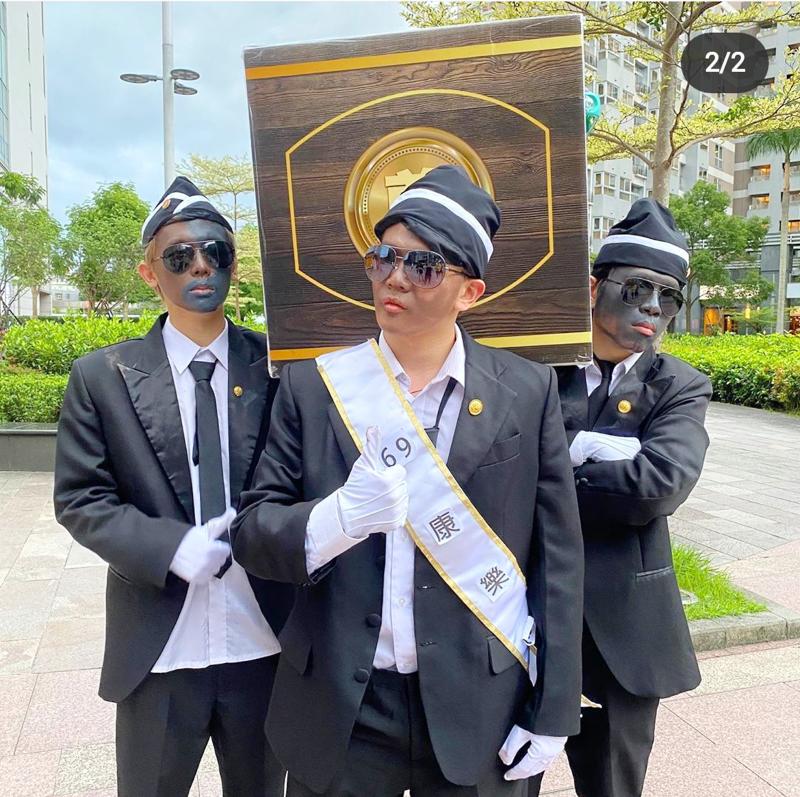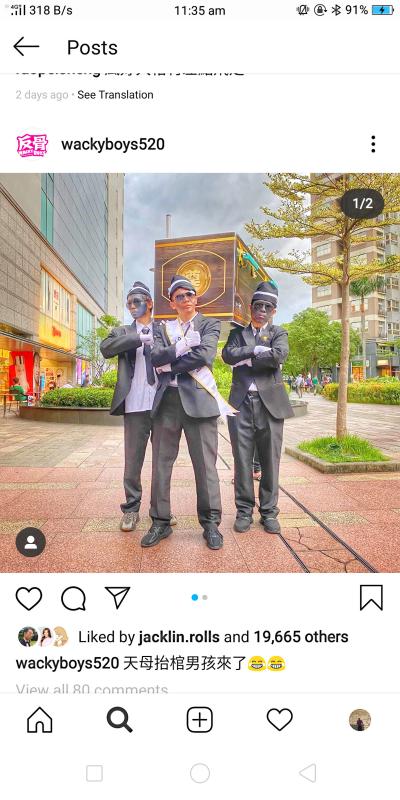African-American entertainer Dooley appeared on local television show Super Entourage (小明星大跟班) a few weeks ago and was told by the crew that they wanted to do a skit in blackface.
Dooley, whose real name is Matthew Candler, tells the Taipei Times that Super Entourage wanted to perform a rendition of the wildly popular “Ghana Coffin Dance,” a meme that has taken the world by storm. Instead, he showed them videos about the racist origins of blackface and slavery in America, and they agreed to drop the makeup.
“[I told them] about the history [behind blackface] and [said] you decide whether you want to do it.”

Photo: Screenshot
Although the crew decided not to do the skit, other Taiwanese groups have drawn fire for performing it in blackface.
At a time when protests against police brutality toward African-Americans rocks the US, YouTubers Wackyboys (反骨男孩), who have over 1.4 million subscribers and over 700,000 Facebook followers, uploaded photos and a video of the Ghana Coffin Dance in blackface this past weekend. The group deleted the performance on Tuesday following criticism from netizens.
This follows popular dance group Luxy Boyz’ performance of the same dance in blackface last month at popular night club Omni. After complaints, the club and crew removed the videos and refrained from wearing blackface in subsequent acts. Although the incident was picked up by a few English-language media outlets, the Chinese-language media seems to have completely ignored the issue — a stark contrast from the commotion when Hsinchu high school students staged a Nazi-themed parade in 2016.

Photo: Screenshot
The only Chinese content that specifically addressed the issue was a video on Dooley’s YouTube channel uploaded on May 9, which had 2,899 views as of press time yesterday. Dooley, who has lived in Taiwan for 17 years, believes that Taiwanese aren’t being intentionally racist, they just don’t know the violent history of African-Americans.
“Everyone, no matter where you go in this world, understands what happened in Nazi Germany,” he tells the Taipei Times, but few understand the violent history that underscores blackface.
“This came about after the end of slavery when white actors would dress up as black people and paint their faces black with big eyes and huge red lips. They would dance around and make a mockery of the slaves and their culture. They used this as a way to really degrade black people.”
Wackyboys could not be reached for comment, and they have yet to post anything regarding the video on their social media platforms after deleting the content. A few netizens have continued to call for them to apologize by posting comments to other photos on Instagram.
“You owe the African community a public apology, not just by deleting your shameful actions,” commented eileendoesart.
The Luxy Boyz incident was handled similarly, with no explanation or apology to be found on their social media. They continue to promote the “non-blackface” version of their act.
Omni issued an apology, claiming ignorance to English-language media, but it cannot be found in Chinese.
While the comments section on the actual video was full of angry accusations of racism after it went viral, few people condemned the preview photos on WackyBoys’ Facebook page before the video surfaced. Out of 75 comments posted before the photos were removed, only a handful mentioned that it was racist. The rest were complimentary.
There are some recent Chinese-language reports explaining the history of blackface and why it is considered racist. But they are all in response to incidents in other countries, such as when Canadian Prime Minister Justin Trudeau apologized last year after pictures surfaced of him wearing brownface as a young man at a party.
An Apple Daily report from September last year, citing the 2018 controversy over a Chinese performer wearing blackface during the Lunar New Year gala on China Network Television, said that although the racism explicit in wearing blackface originated in the US, today it applies to the rest of the world.
However, when Mandopop crooner Jam Hsiao (蕭敬騰) appeared in blackface as Will Smith for Halloween last year, the mainstream media praised his costume and mentioned nothing about the connotations behind it, although a few international English outlets as well as netizens did accuse him of racism. Hsiao eventually took down the photos.
“Don’t think that this is okay because Taiwan doesn’t have this history,” the Facebook account MeiMeiEnglish posted. “[That this is racist] doesn’t change just because we are in a different location with a different history.”
Dooley says that even though the racism is likely unintentional, the offenders should do more than just delete the content.
“Did they come out and apologize, or do anything to spread the knowledge of what this is about and why this is not okay? Did they speak to any black entertainers? I don’t know. They didn’t contact me.”

Google unveiled an artificial intelligence tool Wednesday that its scientists said would help unravel the mysteries of the human genome — and could one day lead to new treatments for diseases. The deep learning model AlphaGenome was hailed by outside researchers as a “breakthrough” that would let scientists study and even simulate the roots of difficult-to-treat genetic diseases. While the first complete map of the human genome in 2003 “gave us the book of life, reading it remained a challenge,” Pushmeet Kohli, vice president of research at Google DeepMind, told journalists. “We have the text,” he said, which is a sequence of

On a harsh winter afternoon last month, 2,000 protesters marched and chanted slogans such as “CCP out” and “Korea for Koreans” in Seoul’s popular Gangnam District. Participants — mostly students — wore caps printed with the Chinese characters for “exterminate communism” (滅共) and held banners reading “Heaven will destroy the Chinese Communist Party” (天滅中共). During the march, Park Jun-young, the leader of the protest organizer “Free University,” a conservative youth movement, who was on a hunger strike, collapsed after delivering a speech in sub-zero temperatures and was later hospitalized. Several protesters shaved their heads at the end of the demonstration. A

In August of 1949 American journalist Darrell Berrigan toured occupied Formosa and on Aug. 13 published “Should We Grab Formosa?” in the Saturday Evening Post. Berrigan, cataloguing the numerous horrors of corruption and looting the occupying Republic of China (ROC) was inflicting on the locals, advocated outright annexation of Taiwan by the US. He contended the islanders would welcome that. Berrigan also observed that the islanders were planning another revolt, and wrote of their “island nationalism.” The US position on Taiwan was well known there, and islanders, he said, had told him of US official statements that Taiwan had not

We have reached the point where, on any given day, it has become shocking if nothing shocking is happening in the news. This is especially true of Taiwan, which is in the crosshairs of the Chinese Communist Party (CCP), uniquely vulnerable to events happening in the US and Japan and where domestic politics has turned toxic and self-destructive. There are big forces at play far beyond our ability to control them. Feelings of helplessness are no joke and can lead to serious health issues. It should come as no surprise that a Strategic Market Research report is predicting a Compound